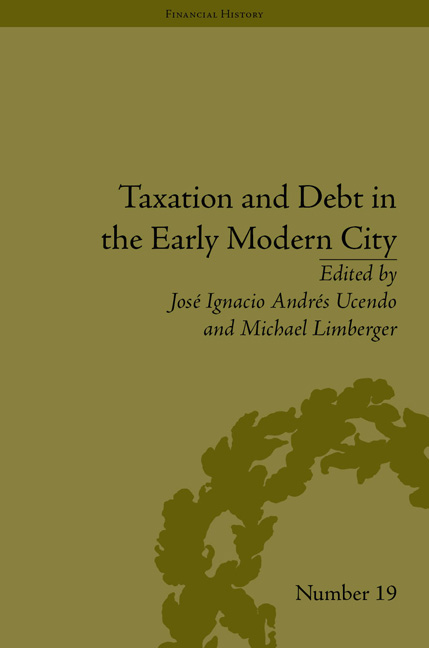Book contents
- Frontmatter
- CONTENTS
- Acknowledgements
- List of Contributors
- List of Figures and Tables
- Introduction
- 1 From Private to Public Management: Tax Farming and Customs Duties in Rome (1630–1700)
- 2 From Taxation to Indebtedness: The Urban Fiscal System of Milan during the Austrias Domination (1535–1706)
- 3 The Urban Tax System in the Kingdom of Naples (Seventeenth to Eighteenth Centuries)
- 4 Public Institutions, Local Politics and Urban Taxation in Seventeenth-Century Aragon
- 5 Taxation and Debt in the Early Modern Castilian Cities: The Case of Seventeenth-Century Madrid
- 6 Tax Collection in Spain in the Eighteenth Century: The Case of the ‘Décima’
- 7 Finances, the State and the Cities in France in the Eighteenth Century
- 8 The Making of the Urban Fiscal System of Antwerp until 1800: Excises, Annuities and Debt Management
- 9 The Dutch Financial System between Public and Private Interests: Urban Debt (1500–1700)
- 10 The Urban Fiscal System in the Habsburg Monarchy: The Case of the Austrian Hereditary Lands in the Sixteenth to Eighteenth Centuries
- 11 Taxation and Debt in Early Modern German Cities
- Notes
- Works Cited
- Index
2 - From Taxation to Indebtedness: The Urban Fiscal System of Milan during the Austrias Domination (1535–1706)
- Frontmatter
- CONTENTS
- Acknowledgements
- List of Contributors
- List of Figures and Tables
- Introduction
- 1 From Private to Public Management: Tax Farming and Customs Duties in Rome (1630–1700)
- 2 From Taxation to Indebtedness: The Urban Fiscal System of Milan during the Austrias Domination (1535–1706)
- 3 The Urban Tax System in the Kingdom of Naples (Seventeenth to Eighteenth Centuries)
- 4 Public Institutions, Local Politics and Urban Taxation in Seventeenth-Century Aragon
- 5 Taxation and Debt in the Early Modern Castilian Cities: The Case of Seventeenth-Century Madrid
- 6 Tax Collection in Spain in the Eighteenth Century: The Case of the ‘Décima’
- 7 Finances, the State and the Cities in France in the Eighteenth Century
- 8 The Making of the Urban Fiscal System of Antwerp until 1800: Excises, Annuities and Debt Management
- 9 The Dutch Financial System between Public and Private Interests: Urban Debt (1500–1700)
- 10 The Urban Fiscal System in the Habsburg Monarchy: The Case of the Austrian Hereditary Lands in the Sixteenth to Eighteenth Centuries
- 11 Taxation and Debt in Early Modern German Cities
- Notes
- Works Cited
- Index
Summary
With the establishment of Spanish domination, the city of Milan, as well as the state of which it was the capital, entered a period of intense transformation. The geopolitical context was changing radically and its involvement in the imperial strategy of the Austrias now required, from the whole Duchy, a substantial participation in terms of resources.
Although most of the costs of the military maintenance of the dominion at the centre of the Po Valley was ultimately sustained thanks to the financial support of other Spanish territories, like Castile and the Kingdom of Naples, the pressure on the Milan state revenues increased as never in the past. For a considerable time, the interest of historians has been directed towards the accompanying rise in the burden of taxation which has been regarded as one of the main causes of the economic decline of Lombardy during the Spanish age and one of the primary components of the related leyenda negra.
This prevailing paradigm – based chiefly on complaints manifest in contemporary sources and heavily influenced by a negative consensus reached in the nineteenth century – has been called into question over the last three decades. Due to source-based studies, the attention on the state financial and fiscal system in the Duchy under the Austrias is progressively losing its historio graphical bias and is broadening, shedding light on all the effects and deep interrelations with social, political and economic aspects.
- Type
- Chapter
- Information
- Taxation and Debt in the Early Modern City , pp. 29 - 48Publisher: Pickering & ChattoFirst published in: 2014



